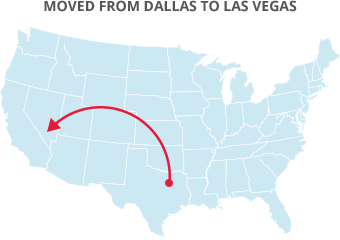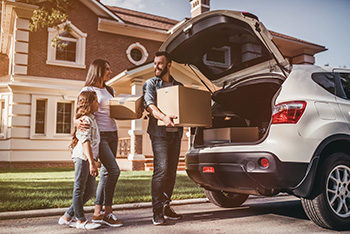

 There is a huge difference between moving across town and moving to a new state. You and your things aren't just making a short jaunt from one home to another, you are making a complicated trek that can take several days and requires a lot of logistics. During this time, it's all too easy to let something important slip through the cracks or mismanage your own expectations of the move. We've seen a lot of interstate moves and can offer a few words of expert advice on how to make sure that you, your items, and your life arrive intact without unnecessary hassle to your new home.
There is a huge difference between moving across town and moving to a new state. You and your things aren't just making a short jaunt from one home to another, you are making a complicated trek that can take several days and requires a lot of logistics. During this time, it's all too easy to let something important slip through the cracks or mismanage your own expectations of the move. We've seen a lot of interstate moves and can offer a few words of expert advice on how to make sure that you, your items, and your life arrive intact without unnecessary hassle to your new home.
First and foremost, know where you are going. Researching your new home is more than just doing a tour of the house before buying or signing a rental lease. We advise you combine internet research with a mini-vacation spent driving around your new neighborhood and city, getting to know the lay of the land and the local services you might want to call on. Parents will be interested in the quality of the school districts, pet owners will need to look into necessary pet licenses, if any. You will also want measurements of your new home's doors to ensure your furniture will make it through.
Every interstate, state-to-state, and cross-country moving service is different. While most professional moving services can provide you with the basics you need to get items from one place to another, don't just choose the first one that pops up in your local Google search. Look into pricing, services, and timing to find a moving company who can provide the moving experience you want most within your moving budget. Don't forget to check their online reputation with others who have moved with the service to make sure you're working with a highly rated mover known for their customer satisfaction.
Packing for an interstate move may involve the same basic tasks, but it feels very different than a local residential move. Because there's no multiple trips or going back for forgotten items, and because you'll need everything squared away quickly in the new destination, make a comprehensive strategic packing plan. Pare down your items with giving things away, donating items to charity, eBay sales or a garage sale if you have more things than you care to take and also, start packing early. Label each box clearly, and let your movers know if you'd like your rooms packed in any particular order for easy fast unpacking.
While your long distance moving company will take care of moving all of your inanimate possessions, you, along with any pets and houseplants, will need to make your way in your own vehicle. Most likely, you will find yourself taking a long road trip. Make sure to plan your cross-country road trip carefully including regular rest stops, where you want to eat, and where you will stay. Book your lodgings well ahead of time and take into consideration any other people, animals, or plants that will be traveling with you.
While you won't get in trouble immediately for having a driver's license connected to your old address, it's best if you get a new driver's license provided by your new state of residence and sporting your new home address. Fortunately, it is incredibly easy to transfer a currently valid license to a new state. Some states can accommodate this request entirely online, which is super convenient.
An interstate move means that mail sent to the wrong address will be incredibly difficult and possibly even costly to have forwarded to you. Make sure to officially change your address with the post office and arrange for temporary mail forwarding so your letters and packages catch up with you efficiently.
Along the same lines, don't forget to do the full transfer of utilities. Make sure to have the utilities of your old home shut off or transferred to a landlord or new owner. At the new home, make sure that the utilities are on and in your name before you arrive. If possible, it's also helpful to have someone like your real estate agent pop in and make sure the refrigerator is running. This will allow you to buy and stow groceries immediately after arrival.
Remember, you may arrive at your destination before the moving truck with your belongings. This means you will need to live out of luggage for a little while, so your luggage should be very well packed. Make sure that you have several changes of clothes, toiletries, medications, all your necessary financial information, and chargers for your personal devices packed. Ideally, put all of these items aside before you pack the rest of your personal items into boxes so that nothing important is forgotten.
Your moving bag should be part overnight-bag and part emergency bag, and it will help you prepare to stay in-transit for as long as your road trip and truck arrival may take. Each person moving with you and each pet should also have their own moving bag to ensure that everyone is properly equipped for a long journey and a few days in a mostly empty home.

No matter how careful you've been up to this point, it's all too easy to go over budget during the move itself. Your road trip plan should include pre-booked hotel rooms and a general knowledge of where you will be stopping to eat and take restroom breaks along the way. Be aware of your budget and keep track of how much you spend on the road. If money is tight, consider packing sandwiches in a cooler and buying your meals from grocery stores or little small-town cafes. If you're making your moving road trip into a vacation with doing sightseeing along the way, just be sure not to spend more than you intended to.
Finally, during an interstate move, make sure to stay in contact with your movers. While most cross-country moves are uneventful and smooth-sailing, sometimes things go wrong and logistics will need to be managed. Maybe your moving truck gets a flat, or maybe you're the one with the flat. You want to be in constant contact with your movers to coordinate the arrival of your items and they may even be able to help you out of a road-trip disaster should an unexpected disaster occur. Make sure that you exchange contact numbers with your driver and discuss delivery plans prior to leaving the origin location.
Moving from state to state is a huge project and one you should take on with all seriousness. When your items are in the hands of professional movers and your own transportation is carefully prepared, your move can feel more like a fun road-trip vacation than a big logistical hassle. Let us help you have a smooth and enjoyable interstate move.

